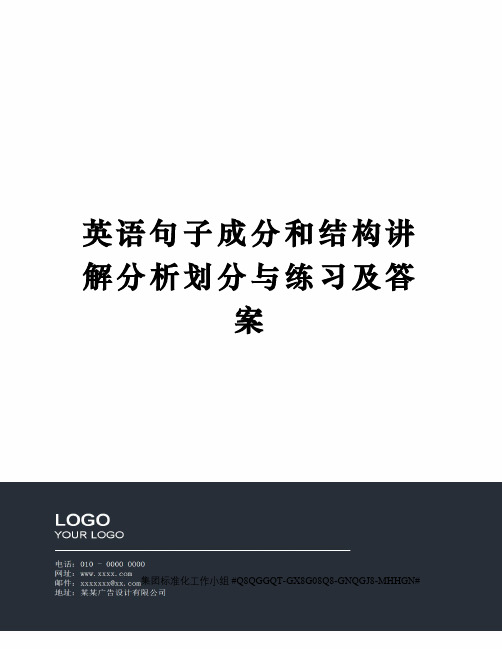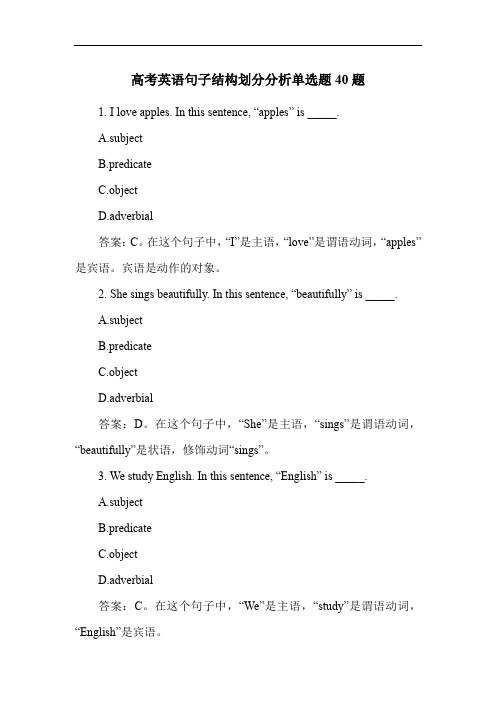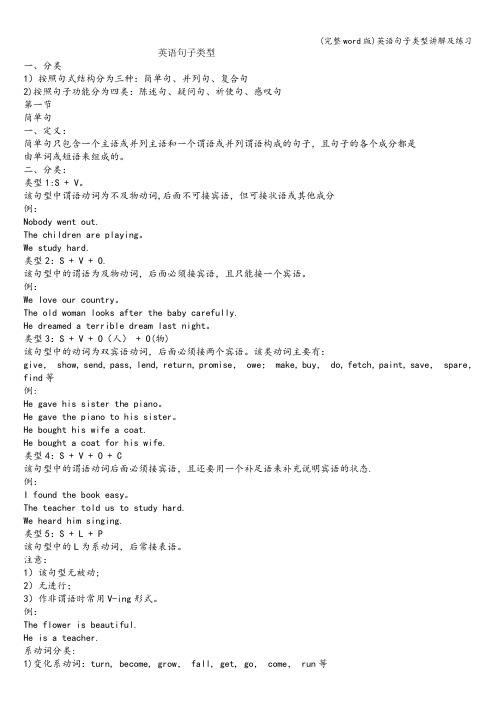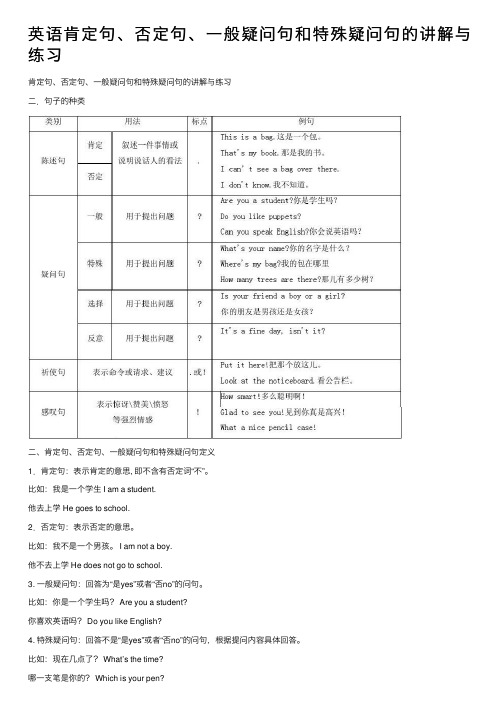最新英语句子分类讲解与专项练习
英语句子分类(附练习答案)

英语句子按其用途可分为:陈述句、疑问句、祈使句和感叹句。
考点一:陈述句【经典习题】( ) 1. The number of the volunteers 100 now. And a small number of them already gone to the workplace.A. is; haveB. are; haveC. is; areD. is; has( ) 2. —What’s the matter, Jenny?— something wrong with my bike.A. It isB. There isC. I haveD. It has( ) 3. The pair of trousers me. I will take it.A. fitB. fitsC. will fit( ) 4. We each WeChat nowadays, even the old people.A. playB. playsC. playing( ) 5. — What would you like to have for supper, Jack?— Either noodles or rice OK. I don’t mind.A. areB. wereC. isD. was【考点点拨】陈述句用于陈述事实或观点,包括肯定结构和否定结构两种。
否定句一般是在系动词、助动词或情态动词后加not或用一些否定词(never, none, neither, nor, few, little, nothing, no等)来表示。
not与all, both, every等构成部分否定。
考点二:疑问句【经典习题】( ) 1. — Is the girl in red your friend?—. She is learning Chinese now.A. Yes, it isB. Yes, he isC. Yes, she isD. Yes, she does( ) 2. — will the match between HAS and BIG be held?— In our school stadium.A. WhenB. WhereC. WhyD. How( ) 3. —do you volunteer in Old People’s Home?— Once a week. We hope to help the old more.A. How soonB. How manyC. How oftenD. How long( ) 4. — Bill, does your sister have brown hair or red hair?—. She takes after my mother.A. Yes, she doesB. No, she doesn’tC. Brown hairD. I don’t know( ) 5. He can hardly stay awake because he is so tired, ?A. is heB. isn’t heC. can’t heD. can he【考点点拨】疑问句用于提出问题,包括一般疑问句、特殊疑问句、选择疑问句和反意疑问句。
英语句子成分和英语句子结构讲解及练习

英语句子成分和英语句子结构讲解及练习英语句子就像一座建筑,句子成分是构成这座建筑的各种材料,而句子结构则是建筑的框架。
理解句子成分和结构对于我们正确理解和运用英语至关重要。
接下来,让我们一起深入探讨。
一、英语句子成分1、主语主语是句子所描述的主体,通常是某人、某事或某物。
它是句子的核心,决定了句子要说的是谁或什么。
比如,“The dog is cute” (这只狗很可爱。
)中,“The dog”就是主语。
2、谓语谓语表示主语的动作或状态。
它通常由动词构成。
例如,“She sings beautifully” (她唱歌很好听。
)中的“sings”就是谓语。
3、宾语宾语是动作的对象,通常是接受动作的人或物。
比如,“He bought a book” (他买了一本书。
)中的“a book”就是宾语。
4、表语表语用于说明主语的特征、状态、身份等。
常见的系动词有 be (am/is/are)、seem、look 等,其后的成分就是表语。
例如,“She is happy” (她很开心。
)中的“happy”就是表语。
5、定语定语用来修饰、限定名词或代词。
它可以是形容词、名词、代词、数词、介词短语等。
例如,“The red car is mine” (那辆红色的车是我的。
)中的“red”就是定语。
6、状语状语用于修饰动词、形容词、副词或整个句子,表示时间、地点、原因、方式、程度等。
比如,“He runs fast” (他跑得很快。
)中的“fast”就是状语。
7、补语补语用于补充说明宾语或主语的情况。
例如,“We made him our monitor” (我们选他当班长。
)中的“our monitor”就是宾语补足语。
二、英语句子结构1、简单句简单句只有一个主谓结构,是最基本的句子类型。
例如,“I love you” (我爱你。
)2、并列句并列句由两个或两个以上的简单句通过并列连词(and, but, or 等)连接而成。
英语句子成分和结构讲解分析划分与练习及答案精修订

英语句子成分和结构讲解分析划分与练习及答案集团标准化工作小组 #Q8QGGQT-GX8G08Q8-GNQGJ8-MHHGN#句子结构及成分①相关概念1.词性的英文缩写在英语学习中,掌握单词词性非常重要。
如果我们在记单词的时只记拼写、读音而不记词性的话,我们就不知道如何使用它们,所以我们在记单词时一定要把单词词性记准记牢。
缩写字母原词代表词性n. noun 名词v. verb动词vt.transitive verb 及物动词vi.intransitive verb 不及物动词modal v. modal verb 情态动词aux. v. auxiliary verb 助动词adj.adjective形容词adv.adverb 副词num. numeral数词interj. interjection感叹词pron. pronoun代词prep.preposition 介词art. article 冠词conj conjunction 连词2.及物动词和不及物动词实义动词后面跟宾语时,这个动词是及物动词。
实义动词后面不跟宾语时,此时这个动词是不及物动词。
The door opened.(open后面没跟宾语,此时,open是不及物动词。
)He opened the door.(open后面有宾语the door, 此时,open 是及物动词。
)注意:英语中一个动词是及物动词还是不及物动词,关键是看它用在句中时后面是否跟宾语。
有些动词既可作及物动词又可作不及物动词,词义相同。
如:The meeting began at six. < vi.>We began the meeting at six. < vt.>有些动词既可作及物动词又可作不及物动词,但词义不同。
如:The man walked away. (walk不及物动词,意为“走”)He walked the dog every day. ( walk及物动词,“遛”)She washes clothes at home. (wash及物动词,“洗”)The clothes washes well. (wash不及物动词,“耐洗”)英语中一些单词是及物还是不及物,可能与汉语不同。
高考英语句子结构划分分析单选题40题

高考英语句子结构划分分析单选题40题1. I love apples. In this sentence, “apples” is _____.A.subjectB.predicateC.objectD.adverbial答案:C。
在这个句子中,“I”是主语,“love”是谓语动词,“apples”是宾语。
宾语是动作的对象。
2. She sings beautifully. In this sentence, “beautifully” is _____.A.subjectB.predicateC.objectD.adverbial答案:D。
在这个句子中,“She”是主语,“sings”是谓语动词,“beautifully”是状语,修饰动词“sings”。
3. We study English. In this sentence, “English” is _____.A.subjectB.predicateC.objectD.adverbial答案:C。
在这个句子中,“We”是主语,“study”是谓语动词,“English”是宾语。
4. He runs fast. In this sentence, “fast” is _____.A.subjectB.predicateC.objectD.adverbial答案:D。
在这个句子中,“He”是主语,“runs”是谓语动词,“fast”是状语,修饰动词“runs”。
5. They play basketball. In this sentence, “basketball” is _____.A.subjectB.predicateC.objectD.adverbial答案:C。
在这个句子中,“They”是主语,“play”是谓语动词,“basketball”是宾语。
6.The book that I read yesterday is very interesting. The underlined part is a(n) _____.A.adverbial clauseB.attributive clauseC.noun clauseD.predicative clause答案:B。
(完整word版)英语句子类型讲解及练习

英语句子类型一、分类1)按照句式结构分为三种:简单句、并列句、复合句2)按照句子功能分为四类:陈述句、疑问句、祈使句、感叹句第一节简单句一、定义:简单句只包含一个主语或并列主语和一个谓语或并列谓语构成的句子,且句子的各个成分都是由单词或短语来组成的。
二、分类:类型1:S + V。
该句型中谓语动词为不及物动词,后面不可接宾语,但可接状语或其他成分例:Nobody went out.The children are playing。
We study hard.类型2:S + V + O.该句型中的谓语为及物动词,后面必须接宾语,且只能接一个宾语。
例:We love our country。
The old woman looks after the baby carefully.He dreamed a terrible dream last night。
类型3:S + V + O(人) + O(物)该句型中的动词为双宾语动词,后面必须接两个宾语。
该类动词主要有:give, show, send, pass, lend, return, promise, owe; make, buy, do, fetch, paint, save, spare,find等例:He gave his sister the piano。
He gave the piano to his sister。
He bought his wife a coat.He bought a coat for his wife.类型4:S + V + O + C该句型中的谓语动词后面必须接宾语,且还要用一个补足语来补充说明宾语的状态.例:I found the book easy。
The teacher told us to study hard.We heard him singing.类型5:S + L + P该句型中的L为系动词,后常接表语。
英语肯定句、否定句、一般疑问句和特殊疑问句的讲解与练习

英语肯定句、否定句、⼀般疑问句和特殊疑问句的讲解与练习肯定句、否定句、⼀般疑问句和特殊疑问句的讲解与练习⼆.句⼦的种类⼆、肯定句、否定句、⼀般疑问句和特殊疑问句定义1.肯定句:表⽰肯定的意思, 即不含有否定词“不”。
⽐如:我是⼀个学⽣ I am a student.他去上学 He goes to school.2.否定句:表⽰否定的意思。
⽐如:我不是⼀个男孩。
I am not a boy.他不去上学 He does not go to school.3. ⼀般疑问句:回答为“是yes”或者“否no”的问句。
⽐如:你是⼀个学⽣吗? Are you a student?你喜欢英语吗? Do you like English?4. 特殊疑问句:回答不是“是yes”或者“否no”的问句,根据提问内容具体回答。
⽐如:现在⼏点了? What’s the time?哪⼀⽀笔是你的? Which is your pen?三、肯定句、否定句、⼀般疑问句和特殊疑问句的相互转换肯定句变否定句:在am, is, are 后⾯加上not,其余按顺序照抄。
肯定句变⼀般疑问句:把am, is, are 提前放到句⾸并⼤写Am, Is, Are,其余照抄。
肯定句变特殊疑问句(就划线部分提问):分3步骤第⼀步:先变⼀般疑问句。
第⼆步:找合适的特殊疑问词代替划线部分。
第三步:特殊疑问词提前放到句⾸,并⼤写,其余按顺序照抄,省略划线部分。
注意:1.如:Liming 's not here today. Who's not here today? 今天谁没来?2.划线部分不能在特殊疑问句中出现。
1.肯定句、否定句和⼀般疑问句的互换肯定句:否定句:⼀般疑问句:肯定回答:Yes, it is.否定回答:No, it isn’t.2.就划线部分提问(变特殊疑问句)This is a book.第⼀步:变⼀般疑问句 Is this a book?第⼆步:找合适的特殊疑问词 Is this what ?What is this?do not或者does not,其余按顺序照抄动词⽤原形。
英语句子分类(附练习答案)
英语句子分类(附练习答案)修改后的文章】陈述句用于陈述事实或观点,包括肯定结构和否定结构两种。
否定句一般是在系动词、助动词或情态动词后加not或用一些否定词(never。
none。
neither。
nor。
few。
little。
nothing。
no等)来表示。
not与all。
both。
every等构成部分否定。
1.The number of volunteers is 100 now。
And a small number of them have already gone to the workplace.2."What's the matter。
Jenny?" "There is something wrong with my XXX."3.The pair of trousers fits me。
I will take it.4.We all play XXX。
XXX.5."What would you like to have for supper。
Jack?" "XXX."疑问句用于询问事实、情况、原因、目的、方法等。
一般情况下,疑问句的语序是将助动词或情态动词提前,如果没有助动词或情态动词,则用do。
does。
did或其否定形式。
特殊疑问句的语序是疑问词+陈述句语序。
1."Is the girl in red your friend?" "No。
she is learning Chinese now."2."When will the match een HAS and BIG be held?" "In our school stadium."3.How often do you volunteer in the Old People's Home。
(完整版)初中英语句子种类专项复习及解析
句子种类专项考点知识精讲陈述句疑问句句子种类祈使句惋惜句必然句I like apples.否定句I don't like bananas.一般疑问句Do you usually go to school by bike ?选择疑问句Would you like tea or coffee?反义疑问句He finished his homework, didn't he?特别疑问句How often do you play basketball?let 引导的祈使句Let me help you.祈使句的否定Don't eat in class.加强语气的祈使句Do be quiet for a moment.what 引导的惋惜句What a brave boy he is!how 引导的惋惜句How beautiful the flowers are!惋惜句的省略What a brave boy!陈述句变换为惋惜She is a good student.——句What a good student she is!what 与 how 引导的What an interesting book it is!——惋惜句的变换How interesting the book is!按用途分,句子可分为四种:陈述句、疑问句、祈使句和惋惜句。
考点一陈述句陈述句用来说明一个事实或陈陈述话人的看法。
陈述句分为必然式和否定式两种,句末用句号,读时用降调,有五种基本句型。
1.陈述句的必然式的形式(1)主语+系动词+表语We are happy. 我们很快乐。
注:系动词有三类,详尽以下:①表状态: be, seem, appear(显得 ), go(变成 ), stand(坐落 ), stay(保持 ), lie( 位于 ), keep(保持 )②表感官: look( 看上去 ), sound(听起来 ), smell( 闻起来 ), feel( 感觉 ), taste(尝起来 )③表变化: get(变得 ),become(成为 ), turn( 变成 ),grow( 渐渐变成 ), come(成为 )(2) 主语+不及物动词They are reading. 他们在看书。
英语句子成分和英语句子结构讲解及练习
英语句子成分和英语句子结构讲解及练习seek; pursue; go/search/hanker after; crave; court; woo; go/run after英语句子成分和英语句子结构讲解及练习简单句的五个基本句型主语+不及物动词Shecame..主语+及物动词+宾语ShelikesEnglish.主语+系动词+主语补语Sheishappy.主语+动词+间接宾语+直接宾语ShegaveJohnabook.Sheboughtabookforme.主语+动词+宾语+宾语补语Shemakeshermotherangry.Theteacheraskedmetoreadthepassage.There+beThereliesabookonthedesk.主谓宾名/代--动词--名/代we--saw--you.we--did--thework.主系表名/代-系动词-形容次/名词/代词youarebeautifulyouseemsworried.youareastufent.相同点都三部分,主语也一样.不同动词和系动词,时态一样,否定式不同.动词加助动词,系动词不用.表语可以是形容词,宾语不行.只有宾语有补足语2、句子成分:英语句子成分分为七种:主语、谓语、宾语、定语、状语、表语、宾语补足语.1、主语是句子所要说的人或事物,回答是“谁”或者“什么”.通常用名词或代词担任.如:I’mMissGreen.我是格林小姐2、谓语动词说明主语的动作或状态,回答“做什么”.主要由动词担任.如:Jackcleanstheroomeveryday.杰克每天打扫房间3、表语在系动词之后,说明主语的身份或特征,回答是“什么”或者“怎么样”.通常由名词、代词或形容词担任.如:MynameisPingping.我的名字叫萍萍4、宾语表示及物动词的对象或结果,回答做的是“什么”.通常由名词或代词担任.如:Hecanspelltheword.他能拼这个词有些及物动词带有两个宾语,一个指物,一个指人.指物的叫直接宾语,指人的叫间接宾语.间接宾语一般放在直接宾语的前面.如:Hewrotemealetter.他给我写了一封信有时可把介词to或for加在间接宾语前构成短语,放在直接宾语后面,来强调间接宾语.如:Hewrotealettertome.他给我写了一封信5、定语修饰名词或代词,通常由形容词、代词、数词等担任.如:Shanghaiisabigcity.上海是个大城市6、状语用来修饰动词、形容词、副词,通常由副词担任.如:Heworkshard.他工作努力7、宾语补足语用来说明宾语怎么样或干什么,通常由形容词或动词充当.如:Theyusuallykeeptheirclassroomclean.他们通常让教室保持清洁/Heoftenhelpsmedomylessons.他常常帮我做功课/ TheteacherwantedmetolearnFrenchallbymyself.老师要我自学法语8☆同位语通常紧跟在名词、代词后面,进一步说明它的情况.如:WhereisyourclassmateTom你的同学汤姆在哪里1.主语subject:句子说明的人或事物.Thesunrisesintheeast名词Helikesdancing.代词Twentyyearsisashorttimeinhistory.数词Seeingisbelieving.动名词Toseeistobelieve.不定式Whatheneedsisabook.主语从句Itisveryclearthattheelephantisroundandtalllikeatree.It形式主语,主语从句是真正主语一指出下列句中主语的中心词①Theteacherwithtwoofhisstudentsiswalkingintotheclassroom.②Thereisanoldmancominghere.③Theusefuldictionarywasgivenbymymotherlastyear.④Todotoday'shomeworkwithouttheteacher'shelpisverydifficult.谓语predicate:是对主语加以陈述,表示主语的行为或状态,常用动词或者动词词组担任,放在主语的后面.WestudyEnglish.Heisasleep.二.选出句中谓语的中心词①Idon'tlikethepictureonthewall.A.don'tB.likeC.pictureD.wall②Thedaysgetlongerandlongerwhensummercomes.A.getB.longerC.daysD.summer③DoyouusuallygotoschoolbybusA.DouallyC.goD.bus④Therewillbeameetingatthelibrarythisafternoon.A.willbeB.meetingC.thelibraryD.afternoon3.表语predicative:系动词之后的成分,表示主语的性质、状态和特征.Heisateacher.名词Youdon’tlook it.代词Fiveandfiveisten.数词Heisasleep.形容词Hisfatherisin.副词Thepictureisonthewall.介词短语Mywatchisgone/missing/lost.形容词化的分词Thequestioniswhethertheywillcome.表语从句常见连系动词“存在”类:表示存在或具有某种特征或状态.这类连系动词强调“存在”.常见的有:be是,look看起来,feel摸上去,seem似乎是,appear似乎、显得,prove证明是,smell闻起来,taste尝起来,sound听起来等.例如:Thestorysoundstrue.Thoseorangestastegoodstar.2.“持续”类:表示某种情况或状态的持续.这类连系动词强调“持续”.常见的有:remain依然,keep保持,stay保持,continue继续、仍旧,stand处于某状况或情形等.例如:Whydon'tyouputthemeatinthefridgeItwillstayfreshforseveraldays.It'salreadyteninthemorning.Thestoreremainsclosed.What'sthematter3.“变化”类:表示由一种情况或状态变化成另一种情况或状态.这类连系动词强调“变化”后的情况或状态.常见的有:become变成,turn变成,grow变得,get变得等.例如:Putthefishinthefridge,oritwillgobadinhotweather.三挑出下列句中的表语①Theoldmanwasfeelingverytired.②WhyisheworriedaboutJim③Theleaveshaveturnedyellow.④SoonTheyallbecameinterestedinthesubject.⑤Shewasthefirsttolearnaboutit.①tired ②worried ③yellow ④interested ⑤first4.宾语:1动宾表示行为的对象,常由名词或者代词担任.放在及物动词或者介词之后.如:IlikeChina.名词Hehatesyou.代词Howmanydoyouneed Weneedtwo.数词Ienjoyworkingwithyou.动名词Ihopetoseeyouagain.不定式Didyouwritedownwhathesaid宾语从句2介词后的名词、代词和动名词-----介宾AreyouafraidofthesnakeUnderthesnow,therearemanyrocks.3双宾语-----间宾指人和直宾指物Hegavemeabookyesterday.Givethepoormansomemoney四挑出下列句中的宾语①Mybrotherhasn'tdonehishomework.②PeopleallovertheworldspeakEnglish.③Youmustpaygoodattentiontoyourpronunciation.④Howmanynewwordsdidyoulearnlastclass⑤Someofthestudentsintheschoolwanttogoswimming.hishomework ②English ③yourpronunciation ④newwords ⑤togoswimming5.宾补:对宾语的补充,全称为宾语补足语.Weelectedhimmonitor.名词Weallthinkitapity thatshedidn’tcomehere.名词Wewillmakethemhappy.形容词Wefoundnobodyin.副词Pleasemakeyourselfathome.介词短语Don’tlethim dothat.省to不定式Hisfatheradvisedhimtoteachthelazyboyalesson.带to不定式Don’tkeepthelights burning.现在分词I’llhavemybike repaired.过去分词扩展:主补:对主语的补充.Hewaselectedmonitor.Shewasfoundsinginginthenextroom.Hewasadvisedtoteachthelazyboyalesson.五挑出下列句中的宾语补足语①Shelikesthechildrentoreadnewspapersandbooksinthereading-room.②Heaskedhertotaketheboyoutofschool.③Shefounditdifficulttodothework.④TheycallmeLilysometimes.⑤IsawMr.Wanggetonthebus.⑥DidyouseeLiMingplayingfootballontheplaygroundjustnow①toreadnewspapersandbooksinthereading-room ②totaketheboyoutofschool ③Lily ④getonthebus ⑤playingfootballontheplayground划出句中的直接宾语和间接宾语①Pleasetellusastory.②Myfatherboughtanewbikeformelastweek.③Mr.Liisgoingtoteachushistorynextterm.④Hereisapen.GiveittoTom.⑤Didheleaveanymessageforme6.定语:修饰或限制名词或代词的词、词组或句子.Yanlingisachemistryteacher.名词Heisourfriend.代词Webelongtothethirdworld.数词Hewasadvisedtoteachthelazyboyalesson.形容词Themanoverthereismyoldfriend.副词Thewomanwithababyinherarmsismysister.介词TheboysplayingfootballareinClass2.现在分词Thetreesplantedlastyeararegrowingwellnow.过去分词Ihaveanideatodoitwell.不定式YoushoulddoeverythingthatIdo.定语从句六挑出下列句中的定语①TheyuseMr.,Mrs.withthefamilyname.②Whatisyourgivenname③OnthethirdlapareClass1andClass3.④Iamafraidsomepeopleforgottosweepthefloor.⑤Themandownstairswastryingtosleep.①family ②given ③third ④some ⑤downstairs7.状语:用来修饰v.,adj.,adv.,or句子.表示时间、地点、原因、目的、结果、程度、条件、方式和让步.以下例句按上述顺序排列Iwillgotheretomorrow.Themeetingwillbeheldinthemeetingroom.Themeatwentbadbecauseofthehotweather.HestudieshardtolearnEnglishwell.Hedidn’tstudyhard sothathefailedintheexam.Ilikesomeofyouverymuch.Ifyoustudyhard,youwillpasstheexam.Hegoestoschoolbybike.Thoughheisyoung,hecandoitwell.七挑出下列句中的状语①Therewasabigsmileonherface.②Everynightheheardthenoiseupstairs.③HebegantolearnEnglishwhenhewaseleven.④Themanonthemotorbikewastravellingtoofast.⑤Withthemedicineboxunderherarm,MissLihurriedoff.①ontheface ②Everynight ③whenhewaseleven ④fast ⑤Withthemedicineboxunderherarm 八、同位语当一个概念词在前,后面的词、词组或者句子是在解释前者时,而且两者的语法功能相同,后者就是前者的同位语.Mr.Black,ourEnglishteacher,isagoodtennisplayer.我们的英语老师——布莱克先生是个优秀的网球手.Football,theonlyinterestinlife,hasbroughthimmanyfriends.足球----他唯一的爱好,让他结交了许多朋友.YesterdayImetTom,afriendofmybrother's.昨天我遇到了我弟弟的朋友汤姆.That’sherhabit,readinginbed.躺在床上看书是她的习惯.Yoursuggestion,tostrikewhiletheironishot,seemedagoodidea.你建议趁热打铁,这个建议很好. Hegaveordersthattheworkshouldbestartedimmediately.他发出指示要立即开始工作.Youstillhaven’tansweredmyquestionwhyyoudidn’tcometoschoolyesterday.你还没有回答我昨天为什么没有上学.同位语从句常跟在某些名词后,对其作进一步的解释.这些名词包括:fact,doubt,idea,news,hope,indication,decision,possibility,assumption,suggestion,ques tion.这类从句常常有that引导,有时也可以用what,why,whether,when等引导.九插入语插入语是说话者对所表达的意思的补充、强调、解释或者说话的态度,其位置灵活常常用逗号或者破折号分开,并且在语法上不影响其他成份.1.插入语常以副词副词短语、形容词形容词短语、介词短语、短语等形式出现.1常见的副词及短语:indeed,surely,however,obviously,frankly,naturally,luckily/happilyforsb.certainly等.九■Therebe句型拓展:Therebe+句词词组”中,there为虚词,be后面的名词词组为句子的真正主语.该句式在使用时须注意如下几点:★Therebe句式表示“有”时,它表示一种存在关系,通常带有一个地点状语,意为“什么地方时候有……”.句式中的主语只能为表泛指的名词词组,此外,其主语还可以带前置或后置定语.例如:1.Thereisablackboardintheclassroom.2.Therearefiveminutestogo.3.Therearetwooldwomenwaitingforyouatthegate.★在正式文体中,该句式中be动词的单复数形式取决于以下两种情况:1该句式中只有一个主语,主语为单数时,be动词用单数;主语若为复数,be动词也用复数.2该句式中有几个并列主语,则按就近原则处理,即与靠近be动词的第一个主语保持一致.例如:1.Thereisroomforimprovement.2.Therearethreeapplesonthetable.3.Therewereonlytwopens,adictionaryandatextbookonthedesk.★“Therebe+主语+不定式”中,不定式可以有主动和被动两种形式,不过在口语中主动形式更为常见.例如:1.Thereisalettertotypetoday.2.Thereisnotimetolose.3.Therearemanythingstobedonenow.★Therebe句式中,be动词有各种变化形式.1be动词有时态变化,可以为一般现在时、一般过去时、现在完成时、过去完成时、将来时等.例如:1.Therearealotofpeopleinthemeeting-room.2.Therewaslittleleft.3.Therehavebeenmanysuchtrafficaccidentsinthepastfewyears.4.Whenhegotthere,hefoundtherehadbeennoonewaitingforhimintheroom.5.Withoutair,therewouldbenolivingthings.6.Thereisgoingtobeastormtomorrowmorning.2Therebe句式中,be之前可以有情态动词.例如:1.Theremaybesomepeoplewhodon’tlikethefilm.2.Thereusedtobeatempleinthevillage.句子种类一按使用目的可分为陈述句、疑问句、祈使句和感叹句.1陈述句DeclarativeSentences:说明一个事实或陈述一种看法. Lighttravelsfasterthansound.光比声速度快.Thefilmisratherboring.这部电影很乏味.Ihaven’tgotacamera.我没有相机.Theyhavenevermetbefore.他们以前从没见过面.疑问句InterrogativeSentences:提出问题.有以下四种:a.一般疑问句GeneralQuestions:Canyoufinishtheworkintime你能按时完成工作吗b.特殊疑问句WQuestions;HQuestionsWheredoyoulive 你住那儿Howdoyouknowthat 你怎么知道那件事c.选择疑问句AlternativeQuestions:Doyouwantteaorcoffee你是要茶还是要咖啡d.反意疑问句Tag-Questions:Heknowsher,doesn’the他不认识她,对不对=Doesheknowheryes,hedoes.No,hedoesn’t.3祈使句ImperativeSentences:提出请求,建议或发出命令,例如:Sitdown,please.请坐.Don'tbenervous别紧张4感叹句ExclamatorySentences:表示说话人惊奇、喜悦、愤怒等情绪,例如:Whatgoodnewsitis多好的消息啊HowgoodthenewsisWhatbeautifulflowerstheyare多美丽的花啊HowbeautifultheflowersareHowlovelythechildis多可爱的小孩啊Whatalovelychildheiswhatacutechildheis二句子按其结构可以分为以下三类:1简单句SimpleSentences:只包含一个主谓结构句子叫简单句,例如:Sheisfondofcollectingstamps.她喜欢集邮.Weallstudyhard.我们都努力学习.Ilovesportsverymuch.我非常喜欢运动.Mummadeabeautifulskirtforme.妈妈为我做了一条漂亮的裙子.Weelectedhimourclasspresident.我们选了他做班长.Therearemorethan3000studentsinourschool.我们学校的学生超过3000名.2并列句CompoundSentences:由两个或两个以上的简单句并列连接起来的句子叫并列句. Thefoodwasgood,buthehadlittleappetite.食物很精美,但他却没什么胃口.Let’shurry,orwewillbelate.咱们赶紧点,要不就迟到啦.Hestudiedhard,andhepassedtheexam.他努力学习并通过了考试.Hefeltnofear,forhewasverybrave.他很勇敢,毫不畏惧.Hewassick,sotheywerequiet.他病了,所以他们很安静.3复合句ComplexSentences:包含一个主句从句和一个或几个从句的句子叫复合句,从句由从属连词引导,例如:Thefilmhadbegunwhenwegottothecinema.我们到达电影院的时候,电影已经开演了.Doyouknowthemanwhoisinthecar你认识坐在汽车里的人吗Whathesaidisnottrue.他说的不是实话.Iknowit’sdifficulttomasteraforeignlanguage.我知道学好一门外语不容易.Thequestioniswhetherhewilljoinusnexttime.问题是下次他是否跟我们一起干. TheideathatIraqcouldbetakenwithinaweekortwowasanunderestimation.伊拉克可以在一两周内就可以拿下的这一想法是估计不足的想法.Togetintouniversity=Ifyouwanttogetintouniversityyouhavetopassanumberofexams.进入大学,你必须通过一系列的考试.元音和辅音的定义:发音时声带振动,呼出的气流通过口腔时不受阻碍,这样形成的语音称为元音.不论声带振动与否,发音时呼出的气流通过口腔或鼻腔时受到一定的阻碍,这样形成的语音称为辅音.发音时声带不振动的辅音称为清辅音.发音声带振动的辅音称为浊辅音.巧记48个国际音标单元音共十二,四二六前中后双元音也好背,合口集中八个辅音共计二十八八对一清又七浊,四个连对也包括.有气无声清辅音,有声无气浊辅音,发音特点应掌握1.音标必须写在括号里,常用的音标括号有斜头和平头两种,其上端不顶第一线,大致与大写字母相齐,下端在第三格的中2.音标没有书写体,也没有大小写,因此书写时必须和印刷体一样,直上直下,没有斜度,其书写规格如下所列.3.下面几个音标是最容易写错的,一定要注意:ai和au不要写成Ai和Au,A:不要写成a:.在打字的时候,不要用a来代替A,把A:打成a:,也不要用g来代替G,把GE:l打成gE:l.4.音标没有书写体,也没有大小写,因此书写时必须和印刷体一样,直上直下,没有斜度,其书写规格如下页所列元音音标学习元音概述:元音是有噪音的语音.形成元音时,声带振动,气流经由咽腔和口腔逸出时,不受到任何阻碍,没有可以听得到的摩擦声.英语里共有20个元音单元音12个,双元音8个.•元音之间的差异,是由发音时各发音器官所采取的不同位置形成的.所谓“不同位置”,指的是舌头的高低与前后,牙床的开合程度,以及唇形的大小和圆扁.但其中决定的因素是舌头的位置:舌头是在口腔的前部、中部或者后部,决定所发的音是前元音、中元音还是后元音;舌身隆起的高度以及舌的哪一部分隆起最高,决定发出的元音是开口元音、半开元音、合口元音、还是半合元音.牙床开合的程度是由舌位的高低所决定的,而双唇的圆扁和大小对形成不同的元音也有相当的影响.因此,描述一个元音的发音部位,主要是描述它的舌位和唇形.Lesson1元音i:i:学习i:发这个音的字母和字母组合eeaeee:mebesheheweeveningee:sweetbeesweepsheepseesleepthreegreenea:meatleafseapeateacheatclean根据发音规则,圈出下列单词中元音字母组合发音相同的两个词.1.seatrainbeancat2.giftfeetteacherd3.pigstartreejeep4.sweetseafishthei发这个音的字母和字母组合ieyeyay•i:pigfishinfifteensixshipthin•e:beginbehindjacketbasketball•y:happyheavybusylorrycarrysunny•lovelystudythirstytwentythirtywindyrainy•ey:monkeymoney•ay:SundaySaturdayFriday根据发音规则,圈出每组中元音字母发音不相同的单词.•1.sofasitkicklip•2.inkgiftjamship•3.handpicturebigsister•4.hotlickpigjelly:发这个音的字母和字母组合erirurearorer:herservetermir:birdgirlskirtfirstdirtyskirtshirtur:nurseThursdayturtlepurplecurtainear:earlylearnor:wordworkworld根据发音规则,圈出每组中元音字母组合发音相同的单词.1.thirtybeerthirstywheat2.bankkinghernurse3.turtlebirdrabbitknee4.roomrunshirtterm发这个音的字母和字母组合ureeraroraeure:pictureer:teacherbrotherdinnerfathersisterar:sugaror:doctora:pandaaboutabovecamerasofaChina根据发音规则,找出发的2个单词写在后面的横线上.1.mothersofaroadsmile2.sitfathersisterfood3.hairdeertigerChina4.sugarsoonearleaderLesson2音标:u:u学习发这个音的字母和字母组合oao:foxcoffeedogshopdogdoctorlonga:watch根据发音规则,找出发:的2个单词写在后面的横线上.1.doctorteacherboxclothes2.coldzooclockdog3.lovebosslotviolin4.watchbeachfoxgirlu:发这个音的字母和字母组合ooouio:dowhowhoseoo:foodmoontooui:fruitjuiceu:rulerrude根据发音规则,找出不发u:的单词.1.juicemoonzoopanda2.toothbroomeyespoon3.headbootnoodlespool4.nooncoolbootwatchu发这个音的字母和字母组合ooouo:womanwolf•oo:lookgoodbookfootwoodu:bullbullet•根据发音规则,选出与其它单词元音发音不相同的单词.1.mouthbooklookpull2.pushtapesugarfoot3.woodkindwolfbull4.bulletwoodcookname四.写出单词或音标.•bru:m d: sit b:d•fut wi: dg ′sist •lookdowatergood•toofootclockfirst •worksisterdoctorsea•五.将下列单词与正确的音标用线连起来.•hot blu:•football huk •blue ki:shook futb:l kiss ht Lesson3音标a:Λe练习a:发这个音的字母和字母组合aarauear •a:grassglassclassplantdancefastfatherlastar:carstararmMarchgardendarkscarf au:laughauntear:heart•根据发音规则,圈出发a:的2个单词. 1.armlipdoctorcard•2.cloudcartgardengate3.ballscarfdarktiger•4.joblorryMarchparkΛ发这个音的字母和字母组合ouooouo:soncomecolourlovemoneyu:sunnutjumpgumbusbrushsupperusou:touchcousincountry•根据发音规则,找出每组中发Λ的单词.1.hearcupbedair2.voiceboyduckant3.vasecornbeargun4.cuteboymoneyher发这个音的字母和字母组合aa:dadcapcatbadapplebagflaghandrabbitantblackfathasstandratmap根据发音规则,找出每组中发的单词.1.ratbedfacesport2.hearcupfatpear3.ricebatfingertree4.seayoungknifeapplee发这个音的字母和字母组合eeae:eggbelldesklegpettenpenea:breadheadbreakfast•根据发音规则,找出每组中不发e的单词.1.catwelllegpen2.sweatmappetelephant3.eggtentalldesk4.breadheadbedtoy音标a:Λe练习•一.抄写音标,一个抄写5遍.•a::Λ:•:e:____•二.选出下列没有相同发音的词.•1.cararmfoodgarden•2.truejumpbuscut•3.bagshortmapflag•4.eggpenheadsmall•5.gotclockbelldog•6.rabbitbookwoodfoot•7.ratbatappleten•8.gunstarduckmoneg•三.写出单词或音标.•pa:stru:mswetsit•f tgtcΛpsh:t•bagcarbusbreadstarhead•四.选出下列每题中元音有几种读音,有一种读音的在里画☆,有两种读音的画△,有三种的画◇•1.hatfastcooklast•2.jeepdoorsungum•3.dadcaphandmap•4.starcarcutfrom•5.skirtsheepbirdher•五.改变下列单词的一个字母,使它变成另一个单词•like_________________交通工具•hat________________动物•lake________________食品•nice_______________数字•hot_________________用品•well_______________用品Lesson4元音音标eiaiiau练习ai发这个音的字母和字母组合iyieuy•i:kitebikenicetigerwriteknife•y:bycryflymyskytrywhy•ie:tiepie•uy:buy•根据发音规则,找出每组中发ai的2个单词.•1.ricegoodjamright•2.shipmineice-creammouse•3.cloudsittieeye•4.writesmalltenniskitei发这个音的字母和字母组合oioy•oi:oilboilcoin•oy:boytoy根据发音规则,找出每组中发i的2个单词.1.soilhearsoycold2.rabbitbedboynoise3.walkvoiseboilword4.teaenjoytoymilkau发这个音的字母和字母组合ouowou:housemousemouthtrousersow:flowercowhownowdown•根据发音规则,选出不发au的单词. 1.mousecloudarmclown2.teachertrouserscowmouth3.towndanceflowerhouse4.towerblousenowbaby四.把下列单词下正确的音标连接起来•bowbau•gatepai•traygeit•pietrei•poisonpizn五.看图、填空、标号•h___t→s__n→e____s__r→•r__l____→c__k___→m____thLesson5元音音标uieu的练习u发这个音的字母和字母组合ooaowo:noserosepoenoveroa:boatcoatsoapgoatow:showwindowsnowbowl根据发音规则,圈出每组中发u的2个单词. 1.coatgoattreeriver2.makewindowkniferoad3.yourwhiterowcoat4.boathennoselampi发这个音的字母和字母组合eareerear:earhearteareer:deerbeer根据发音规则,圈出每组中发i的1个单词.1.bearbeerfairtail2.noodlespairnearcome3.horseneartowerair4.ringkingherethreee发这个音的字母和字母组合airearair:hairchairpairear:pearbearwear根据发音规则,圈出每组中发e的1个单词.1.bearideapineappletail2.noodlespairclimbcome3.horsehousetowerair4.ringkingharethreeu发这个音的字母和字母组合oorourureoor:poorour:tourure:surepure根据发音规则,圈出每组中发u的1个单词.1.cleartouristpineappletail2.noodlespairclimbfury3.beardcuretowerair4.voicekingpureengineer辅音爆破音:ptkbdg摩擦音:fvszθe破擦音:trdrtsdzt∫t3鼻辅音:mnη舌侧音:1出现在元音之前叫作清晰舌边音2出现在辅音及单词末尾时叫作模糊舌边音半元音:擦音中气流较弱,摩擦较小,介于元音跟辅音之间的音wj •3∫•hrLesson6辅音音标pbtd练习p发这个音的字母和字母组合pppp:pianopandaparrotpetshipsheeppigstoppp:applehappy根据发音规则,圈出没有发p的单词.1.shipphonesleeppear2.pickpenbigpineapple3.taxiparrotsheeppig4.pandaponypettruckb发这个音的字母和字母组合bbbb:bookballbirdbigboybagbananabb:rubberrabbitcabbage根据发音规则,圈出发b的2个单词.1.cabgiftbeachlove2.petgodtubbed3.weatherboybusmake4.rabbitreaddressbabyt发这个音的字母和字母组合tttt:tableteataxicatratfatticketTt:buttermatter根据发音规则,圈出没有发t的1个单词.1.taxifatbagtoy2.hatticketteaduck3.pocketpacketcatraind发这个音的字母和字母组合dedd:duckseeddoordeskdayredheadbedreadcolded:smiledopenedplayed根据发音规则,圈出没有发d的1个单词.1.bedclotheshand2.dogcoldfive3.danceduckgrape音标pbtd练习一.抄写音标,一个抄写5遍.•p:b:t:d:_______二.选出下列没有相同发音的词•1.pearshipcoatpig•2.taxibeancabcabbage•3.hatseaticketwallet•4.seeddancehandfull•5.pickpensitpineapple•6.coldfinddoorchair•7.clothpurplepoolpush•8.eatfanquietset三.写出单词或音标.•p ndkΛtdi:pklaud•applepearrabbitread四.改变下列单词的一个字母,使它变成另一个单词.•short→_____________衣物sea→_________________感官动词•pet→______________蔬菜ten→___________________动物Lesson7辅音音标kgsz学习g发这个音的字母和字母组合gggg:glassgolfgetgirlbaggoatflaggg:egg根据发音规则,圈出发g的单词.gasdrivegumgiveviolinbagjeansorangelogbridgeguesstankgradelonglanguages发这个音的字母和字母组合scssces:starsunsnakeseaseec:pencilcitycedarceilingcelebratess:grassglassclassbossce:faceracericenice根据发音规则,圈出每组中2个发s的单词.1.whosejuicelickstudent2.thosecasescarfshoes3.spacenosesciencemeat4.tearspiecebusnoseLesson8辅音音标∫3t∫d3练习3发这个音的字母和字母组合ss:television,usually,Asiameasureagarage,anunusualcollision;agreatdecision;mypleasure根据发音规则,圈出下列单词中发3的2个单词.1.shellshipgaragedesk2.truckshirtpleasureship3.brushcasualsheepsleep4.heroshapeleisureshelft∫发这个音的字母和字母组合chtchch:teacherpeachcherrychairtch:watchmatch根据发音规则,找出下列单词中发t∫的单词,并抄下来. chairdumplingbeachcheesenightshemonkeyChinachurchtheseflowereggdreamsharkchickcatchLesson9音标fvθe的练习v发这个音的字母和字母组合vvev:videovasevestve:fiveloveviolin根据发音规则,在不发v的单词上打×violinmovevotewindowvanvolcanowhitewomanvictorywetwavevasee发这个音的字母和字母组合thth:fathermotherbrotherclothesweather根据发音规则,圈出每组中发e的1个单词. 1.thansisterbrotherthree2.weatherthanknightgood3.tielookteeththey4.thinfatherthroatwatchLesson10辅音音标tsdztrdr的练习dz发这个音的字母和字母组合dsdesds:seedswoodsfriendsbirdsbedsdes:rides根据发音规则,找出发dz的5个单词写在后面的横线上. coatshandscatskitesbedswordspetskidsseatshorsesandsgatestr发这个音的字母和字母组合trtr:treetrucktrousersstrawberrytrick根据发音规则,找出没有发tr的3个单词写在后面的横线上. seatstrucktraintrashtractordrinkstreetdrugtrousersdr发这个音的字母和字母组合drdr:drawdrinkdriverdragondry根据发音规则,找出每组中发dr的2个单词写在后面的横线上.1.dreamduckdressrain2.ratdraindrugdoor3.treetreasuredrawerdrink4.truckdragondishdrumLesson11辅音音标hrlm的练习r发这个音的字母和字母组合rrrwrr:riceroomrideroadroserr:mirrorcarrotparrotwr:writewrongwrap根据发音规则,选出发r的单词,打√.1.breaddriverwrongrainworker2.riverfatherrobotropesister3.writefruitrabbitcrowndruml发这个音的字母和字母组合lll•l:looklightlockluckyliontail•ll:ballpulldollartell根据发音规则,选出每组中不发l的单词.•mpnailflagwoman•2.yellowfruitlionlychee•3.grapebulllaughlake•4.dumplingmoonwheelwhaleLesson12音标nηwj的练习n发这个音的字母和字母组合nkngnn:nosenetnutbanananoodlestrainrainplanedownkn:kneeknifeknockgn:sign根据发音规则,找出发n的单词并抄下来.1.mirrorwheelyesknock2.mallhenlaughnut3.earringsplanewingbreadη发这个音的字母和字母组合nngn:inkbanktankfingerng:singhangsongkingreadingrunning根据发音规则,从下列每组中找出2个发η的单词. 1.netringfingermeat2.tennismouthsongswing3.dumplingwingrunnail4.hangswiminknotew发这个音的字母和字母组合w:winterwindowwatchwaterwellwouldwh:whitewherewhichwhenwhywheelwhale根据发音规则,选出每组中不发w音的1个单词.1.woodwritewheelwhich2.wheatsnowwetwoman3.whitewindownowwhy4.whalewaterwatchrowj发这个音的字母和字母组合yy:yo-yoyogurtyardyesyouyour根据发音规则,找出发j的单词写在下面横线上. cryyouyourskyyellowlorry moneyjellytoyboyyogurtsoy。
初中英语句子分讲解_练习及答案
句子成分及基本句型一、考点、热点回顾【句子的成分】在英文中句子成分包括:主语、谓语、宾语(直接宾语、间接宾语)、表语、定语和状语、宾语补足语等。
(一)主语:主语是谓语讲述的对象,表示所说的“是什么”或“是谁”。
一般由名词、代词、不定式或相当于名词的词或短语来充当。
它在句首。
如:(1)Lucy is a beautiful nurse. (名词作主语)(2)He reads newspapers every day. (代词作主语)(3)Smoking is harmful to the health. (动名词作主语)(4)To swim in Kunming Lake is a great pleasure.(不定式作主语)(5)What we should do is not yet decided. (主语从句作主语)(二)谓语说明主语“做什么”“是什么”或“怎么样”。
谓语(谓语部分里主要的词)必须是动词。
谓语和主语在人称和数两方面必须一致。
它在主语后面。
如:His parents are teachers. (系动词和表语一起作谓语)We study hard. (行为动词作谓语)We don’t finish reading the book. (助动词和行为动词一起作谓语)He can speak English. (情态动词和行为动词一起作谓语)(三)宾语宾语是动作、行为的对象,由名词、代词、不定式或相当于名词的词、短语来担任,它和及物动词一起说明主语做什么。
一般放在谓语之后。
She is doing her homework now.(名词作宾语)She says(that)she is ill.(宾语从句作动词宾语)We often help him.(代词作宾语)He likes to play basketball.(不定式作宾语)We enjoy listening to the music. 我们喜欢听音乐。
- 1、下载文档前请自行甄别文档内容的完整性,平台不提供额外的编辑、内容补充、找答案等附加服务。
- 2、"仅部分预览"的文档,不可在线预览部分如存在完整性等问题,可反馈申请退款(可完整预览的文档不适用该条件!)。
- 3、如文档侵犯您的权益,请联系客服反馈,我们会尽快为您处理(人工客服工作时间:9:00-18:30)。
句子The Sentences知识要点:句子按使用的目的可分为四类:1、陈述句2、疑问句3、祈使句4、感叹句从结构上看句子可分为三种类型:1、简单句2、并列句3、复合句一、句子的种类(Kinds of Sentences)1、陈述句:(1)肯定句:We love our motherland. 我们热爱祖国。
(2)否定句:They don’t go to work on Sundays. 他们星期日不上班。
说明:叙述或否定一个事实或看法。
2、疑问句:(1)一般疑问句:Are you a worker? 你是个工人吗?Yes, I am. 是的,我是工人。
Haven’t you seen the film? No, I haven’t. 你没看过这部电影吗?没看过。
说明:以一个助动词,情态动词或动词be开始的问句。
回答要用yes或no。
(2)特殊疑问句:Who is the man? 这人是谁?When do you watch TV? 你什么时间看电视?What are they doing now? 他们现在正在干什么?说明:以一个疑问代词或疑问副词开头的句子一般要用倒装句语序(或称为疑问词加一般疑问句)(3)选择疑问句:Do you want tea or coffee? Either will do. 你要茶水还是要咖啡?哪种都行。
Does he learn Japanese or French? He learns French. 他学日语还是学法语?他学法语。
说明:提出两个或两个以上的情况,选择一个作为答案。
(4)反意疑问句:They are going to the airpor t, aren’t they? 他们要去机场,是吗?You haven’t finished your homework, have you? 你没做完作业,是吗?说明:提出情况或看法问对方是否同意。
在陈述句后附加一个简短的疑问句,即前面句子肯定,后为否定;前面句子否定,后为肯定。
He seldom went to bed at ten, did he? 他很少在十点钟上床睡觉?是吗?He knows little Russian, does he? 他几乎不懂俄语,是吗?说明:当陈述句部分含有never, no, hardly, seldom, little等否定意义的副词时,附加问句用肯定形式。
3.祈使句:a.陈述句:Be sure to get there at eight. 八点钟一定要到那儿。
b.否定句:Don’t worry. I’ll help you out. 别担心,我会帮助你的。
说明:表示命令,请求,叮嘱,号召等,谓语动词用原形。
4.感叹句:感叹句通常有what, how引导,表示赞美、惊叹、喜悦、等感情。
what修饰名词,how 修饰形容词,副词或动词,感叹句结构主要有以下几种:掌握它的搭配,即掌握了感叹句的重点。
How +形容词+ a +名词+ 陈述语序。
例如:How clever a boy he is! 他是多聪明的孩子!How+形容词或副词+陈述语序。
例如:How lovely the baby is! 小毛头真可爱!What +名词+陈述语序。
例如:What noise they are making! 他们真吵!What +a/an+形容词+名词+陈述语序。
例如:What a clever boy he is! 他是多聪明的孩子!What+ 形容词+复数名词+陈述语序。
例如:What wonderful ideas (we have)! 我们的主意真棒!What+ 形容词+不可数名词+陈述语序。
例如:What cold weather it is! 多冷的天!What a clever boy he is!的省略形式为:What a clever boy!what + n.:What great changes we have had these years! 这几年我们有了多么大的变化啊!What a fine day it is! 多好的天呀!how + adj.:How brave he is! 他多么勇敢呀!how + adv. :How hard they are working! 他们工作多努力呀!How time flies! 时间过得多么快呀!How + adj. + a (an) + n.How nice a boy (he is)!=What a nice boy he is! 多么好的孩子啊!说明:表示说话时惊异,喜悦,气忿等情绪。
what修饰名词,how修饰形容词、副词或句子。
二、句子的类型(Types of Sentences)1、简单句的句子的类型:一个主语+一个谓语,例:The girl plays the piano every day. 那女孩每天弹钢琴。
两个主语+一个谓语,例:Tom and I are good friends. 汤姆和我是好朋友。
一个主语+两个谓语,例:He opened the door and left. 他打开门出去了。
两个主语或两个谓语或更多,例:Mr and Mrs Smith went to the market, bought some fruit and visited their friends.史密斯夫妇去市场,买了些水果,并看望了朋友。
结构特殊:只含有一个词或一个词组,例:Hello! 喂!Help! Help! 救命啊!救命!Many thanks. 万分感谢。
2、简单句的基本句型(The Basic Sentence Patterns)句型结构:(1)主语+不及物动词:S + Vi.,例:Birds fly. 鸟飞They disappeared. 他们消失了。
(2)主+ 连系动词+ 表语:S + V + P,例:She is a university student. 她是一名大学生。
He has become a pilot. 他已成为一名飞行员。
(3)主+ 及物动词+ 宾语:S + Vt + O,例:He likes swimming. 他喜欢游泳。
We help each other. 我们互相帮助。
(4)主+ 及物动词+ 间接宾语+ 直接宾语:S + Vt + O + O,例:I told my friend the good news. 我把好消息告诉了我的朋友。
They sent us a telegram. 他们给我们拍了电报。
(5)主+ 及物动词+ 宾语+ 补语:S + Vt + O + C,例:They named the boy Jack. 他们给孩子起名叫杰克。
I want everything ready by eight o’clock. 我要求一切都要在八点前准备好。
注:S = Subject(主语)Vi=Intransitive Verbs(不及物动词)Vt=Transitive Verb(及物动词)P=Predicative (表语)O=Object(宾语)C=Complement补语重点、难点:否定陈述句要注意下列几点:(1)否定陈述句主要是在肯定句中加not或no (= not a /any) 构成的,除not和no外,用具有否定意义的副词也可构成否定陈述句。
常用的词有hardly, seldom, never, little, scarcely, barely, rarely等。
(2)其他成分的否定形式有些句子的结构上属于肯定式,但含有否定意义的词,可分以下几种。
否定的主语:Nobody will agree with you. 没人同意你的意见。
None of the students like the novel. 没有学生喜欢这本小说。
No student here studies Russian. 这里没有一个学生学俄语。
否定的宾语:We saw nothing in the darkness. 在黑暗中我们什么都看不见。
He will borrow the book from nobody. 他从谁那都借不来这本书。
You must remember not to be late for class. 你必须记住上课不准迟到。
否定的状语:They came here not by bike but on foot. 他不是骑车来的而是走着来的。
We could find him nowhere. 我们什么地方也找不到他。
(3)不定代词all, both, everyone或everybody用于否定句时,表示部分否定。
All the trees here are not apple trees. ( = Not all the trees here are apple trees. )这里的树并非都是苹果树。
(有的是苹果树,有的不是。
)Both of the sisters are not nurses. ( = Not both of the sisters are nurses.)这姐儿俩并不都是护士。
Everybody can’t do it. (= Not everybody can do it. )并不是人人都能做这件事。
【专项训练】:一、陈述句和疑问句:1、They happy when they hear the news.A.will B.will be C.were D.don’t2、——“ Is your uncle a driver?”——“.”A.No, but my aunt is B.Yes, but my anut isC.No, he doesn’t D.Yes, he does3、We satisfied with their work.A.don’t B.are not C.won’t D.weren’t being4、He coffee at all. He tea.A.doesn’t like, prefers B.likes, doesn’t preferC.would like, not prefers D.prefers, is not fond of5、She me only twice since last year.A.sees B.was seeing C.has seen D.have seen6、My grandma in the country. Now she in the city.A.used to live, lives B.used to living, livedC.uses to live, is living D.was used to live, lives7、You make such mistakes again.A.should never B.should not alwaysC.would always not D.would not forever8、“Can you drive a car?” “.”A.Yes, and Jim can’t too B.Yes, but Jim can’tC.No, but Jim can, too D.No, but Jim can’t9、“Are you going to the super market?” “ No, .”A.I cycle there B.I walk thereC.to the work D.I’ve already been there10、In England tea with milk or sugar in it.A.usually drinks B.is usually drunkC.usually is drunk D.drank usually11、“Is she going to the post office?” “No, .”A.she do esn’t B.she goes by bikeC.to the shops D.she’s on the bike12、Tom like reading at all. He interested in playing basketball.A.doesn’t, is B.doesn’t, were C.is, does D.was, is 13、When home from work?A.do your parents come B.does your parents comeC.have your parents D.our parents come14、Which of the students the examination?A.not pass B.didn’t pass C.pass D.didn’t passed 15、They trouble lifting the heavy box.A.didn’t have many B.hadn’t a lot ofC.didn’t have much D.haven’t a great deal of 16、——“Did you have breakfast this morning?——“.”A.Yes, I had B.Yes, I did C.No, I hadn’t D.No, I didn’t have. 17、colour is the cover of the dictionary?A.What B.Which C.How D.Whose18、“does he brush hi s teeth a day?” “Twice.”A.What time B.How long C.When D.How many times 19、There are many pictures on the wall.do you like best?A.What B.Which oneC.Which of the picture D.Which one picture20、Since when her?A.did you know B.have you knownC.do you know D.you know21、“That ten pound note belongs to me.” “.”A.Yes, it is B.Yes, it belongs C.No it doesn’t D.No, it isn’t 22、“Would you rather wait or come back later?” “.”A.I’d rather come back B.Yes, I’d rather not waitC.No, I’d rather wait D.to come back23、“shoes do you take?” “Size 42.”A.Which number B.What numberC.What size D.What24、“is the weather like today?” “ It’s windy.”A.What B.How C.What kind D.Which25、Would you read my composition and correct the mistakes, ?A.if have B.if any C.if ever D.if not26、is the distance between these two villages?A.How far B.What C.How long D.How much27、do you go to the cinema? Twice a month.A.How many time B.How muchC.How long D.How often28、How it in English?A.you say B.do you speak C.do you say D.to speak29、is the population of the city?A.How much B.How many C.How D.What30、did she get this information?A.Whom B.Who C.Where D.What31、does your watch cost? Two hundred yuan.A.How many B.What price C.What D.How expensive32、About do you want to know more?A.Whom B.who C.which D.what33、——We haven’t heard from Jane for a long time.——What do you suppose to her.A.was happening B.to happenC.has happened D.having happened34、——Have you heard the news about Jim?——No. What ?A.is it B.it is C.are they D.they are 35、——Would you rather go there by train or by air?——.A.Yes, I would B.No, I wouldn’tC.Yes, by air D.By air36、I go or you go yourself?A.Will…will B.Shall…shall C.Shall…will D.Will…shall 37、——Do you think the question easy or not?——.A.Yes, I do B.No, I don’t C.It is easy D.Yes, it’s easy 38、Shall we stay at home or to the park?A.to go B.going C.go D.will go39、writer is better known in China, Charles Dickens or Mark Twain?A.Whichever B.Whether C.What D.Which40、——was the Nanjing-Changjiang Bridge open to traffic?——It was open to traffic in 1968.A.What B.What time C.How long D.When二、感叹句、祈使句41、from Beijing to London!A.How long way it is B.What a long way it isC.What a long way is it D.How long a way is it42、Oh, John, you gave us!A.How a pleasant surprise B.How pleasant surpriseC.What a pleasant surprise D.What pleasant surprise43、terrible weather we’ve been having these days!A.How a B.What a C.How D.What44、girl she is!A.What bright a B.How a brightC.How bright an D.What a bright45、we have today?A.How fine day B.What fine dayC.How a fine day D.What a fine day46、How flowers are!A.beautiful B.beautifullyC.beautiful the D.beautiful that 47、How !A.does time fly B.times fly C.time flies D.flies time 48、What work he does!A.harder B.hard C.hardly D.hardest49、careful our monitor is!A.How a B.How C.What a D.What50、advice he gave us!A.What a B.How good C.What good D.How51、picture it is!A.What wonderful B.How a wonderfulC.What wonderful a D.How wonderful a52、I wish to pay a visit to Hongkong!A.How do B.What do C.What D.How53、hardworking students they are!A.What B.What a C.What an D.How54、long time it lasted!A.What B.What a C.How D.How a55、down the radio. The baby’s sleeping in the next room.A.Turning B.To turn C.Turn D.Turned56、Let’s football in the street.A.not to playB.not play C.don’t play D.not playing57、careful when you cross the street.A.Don’t be B.Do be C.Being D.Do58、the child all day long!A.Let, not to cry B.Not let, cryC.Don’t let, to cry D.Don’t let, cry59、afraid of make mistakes!A.Don’t be B.Not to be C.Not being D.Be not60、me again before coming.A.Calling B.To call C.Do calling D.Call三、反意疑问句61、You’d like some coffee, ?A.weren’t you B.wouldn’t you C.hadn’t you D.shouldn’t you62、I don’t think he will come to the meeting, ?A.will he B.won’t he C.do I D.am I63、Harry and his brother promised to work harder, .A.do they B.do n’t they C.did they D.didn’t they64、His father knows little about it, he?A.does B.doesn’t C.is he D.isn’t65、We all like reading story books, ?A.do we B.do you C.don’t we D.don’t you 66、My sister seldom goes to the theatre she?A.doesn’t B.does C.is D.isn’t67、Your father promised to buy a computer for you, he?A.often, did B.never, didn’t C.already, did D.never, did 68、Be sure to write to us, ?A.will you B.aren’t you C.would you D.can you69、Don’t smoke in the meeting room, you?A.do you B.will you C.would D.can70、It’s fine today. Let’s go fishing, ?A.will we B.shall we C.do we D.don’t we71、Mary has few friend in Japan, she?A.has B.don’t C.doesn’t D.hasn’t72、There is a beautiful lake in this city, ?A.isn’t it B.isn’t there C.is it D.hasn’t it73、There is nothing wrong with my bike, ?A.is it B.isn’t there C.isn’t it D.is there74、He comes late sometimes, ?A.isn’t he B.comes he C.doesn’t he D.is he 75、——You are not a new comer, are you?——. I came here only yesterday.A.No, I am B.Yes, I am C.No, I’m not D.Yes, I’m not.76、She could hardly believe it, ?A.couldn’t she B.could she C.didn’t she D.did she77、You needn’t go, ?A.can you B.must you C.need you D.may you 78、You must work hard from now on, ?A.can you B.won’t you C.mustn’t you D.needn’t you79、After walking so long a way, you must have been tired, you?A.were B.have C.haven’t D.mustn’t80、He must have left home yesterday, he?A.h asn’t B.didn’t C.mustn’t D.needn’t81、You don’t think I’m going out in such wet weather, ?A.am I B.do you C.don’t you D.do I82、You’d better call in a doctor for your mother, you?A.had B.would C.hadn’t D.wouldn’t83、You need to come earlier, you?A.don’t you B.needn’t C.don’t D.won’t84、You dare not go alone, you?A.don’t B.do C.dare D.daren’t85、He shouldn’t drink so much, he?A.should B.ought C.would D.will86、Nothing can stop us doing that, ?A.can we B.can’t we C.can’t it D.can it87、I’m late for the meeting, ?A.amn’t I B.aren’t I C.don’t I D.aren’t you88、Nobody but I knows Japanese in my class, ?A.does he B.doesn’t he C.do they D.don’t they89、None of the workers attended the party, ?A.did they B.did he C.didn’t he D.didn’t they90、Everything is right here, ?A.isn’t it B.aren’t they C.are they D.is it91、A lovely day, ?A.is it B.does it C.isn’t it D.doesn’t it92、He isn’t a diligent boy, for it is the second time he has been late, ?A.isn’t it B.is he C.has he D.is it93、My sister often needs help with her study, ?A.need she B.needn’t she C.doesn’t she D.does she94、You should have watered the flower earlier, ?A.shouldn’t you B.didn’t you C.don’t yo u D.haven’t you95、Learning a foreign language well is not easy, ?A.is it B.isn’t it C.does it D.doesn’t it96、What a pretty girl, ?A.isn’t it B.is it C.is she D.isn’t she97、Wang Ping can’t be in the bedroom, ?A.can she B.is she C.can’t he D.isn’t he98、I wish to visit the Palace Museum next week, ?A.do I B.Shall I C.may I D.can I99、Let us do it for you, ?A.will you B.won’t you C.shall we D.shan’t we100、They have to face the difficulty, they?A.do B.don’t C.haven’t D.won’t【答案】:1、B2、A3、B4、A5、C6、A7、A 8、B 9、D 10、B 11、C 12、A13、A 14、B 15、C 16、B 17、A 18、D19、B 20、B 21、C 22、A 23、C 24、A25、B 26、B 27、D 28、C 29、D 30、C31、C 32、A 33、C 34、A 35、D 36、C37、C 38、C 39、D 40、D 41、B 42、C43、D 44、D 45、D 46、C 47、C 48、B49、B 50、C 51、D 52、D 53、A 54、B55、C 56、B 57、B 58、D 59、A 60、D61、B 62、A 63、D 64、A 65、C 66、B67、D 68、A 69、B 70、B 71、A 72、B73、D 74、C 75、B 76、B 77、C 78、C79、C 80、B 81、B 82、C 83、A 84、C85、A 86、D 87、B 88、C 89、A 90、A91、C 92、A 93、C 94、B 95、B 96、D97、B 98、C 99、A 100、B7.若选B 翻译为:你不能再一次经常犯这样的错误。
